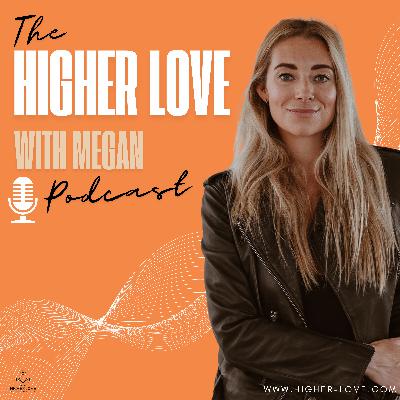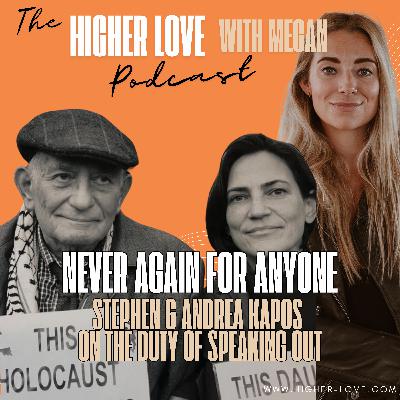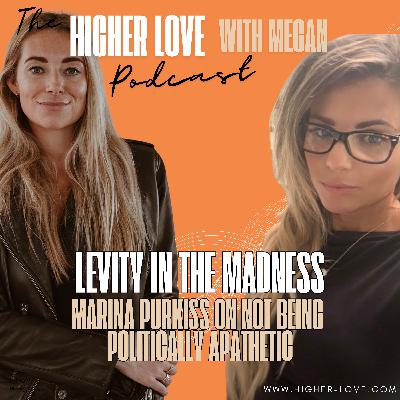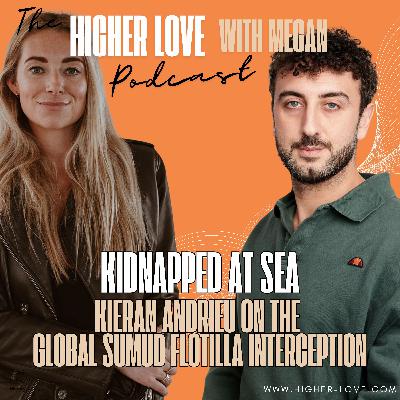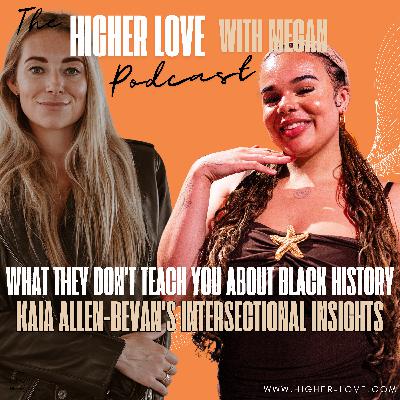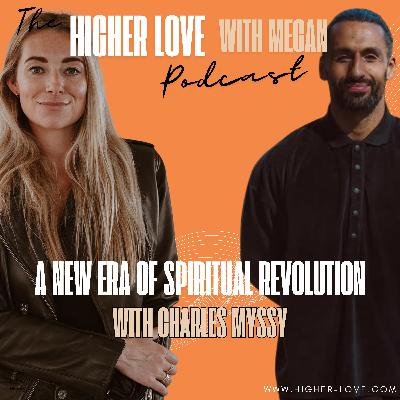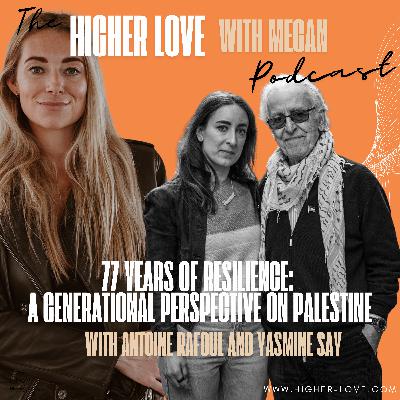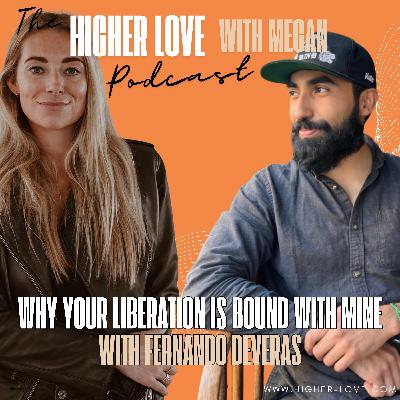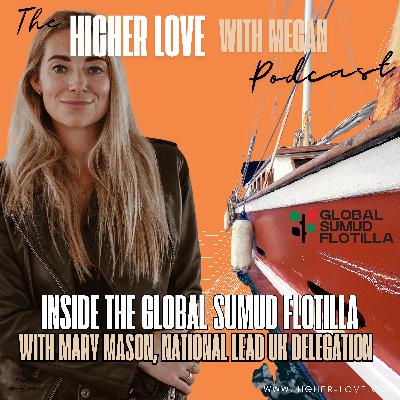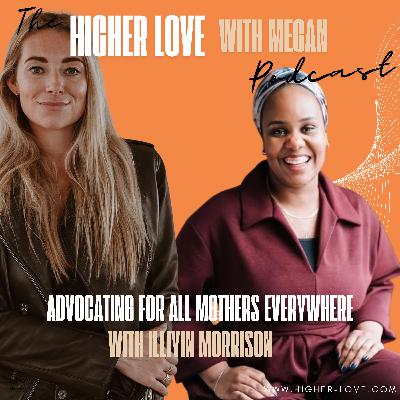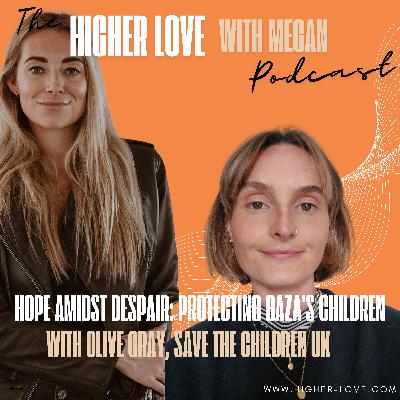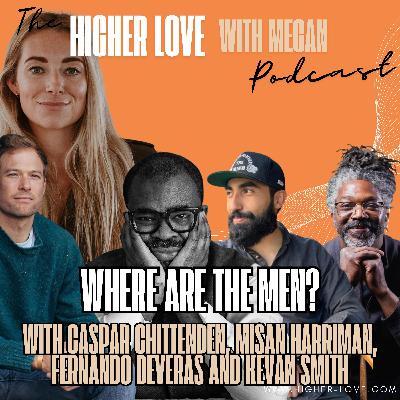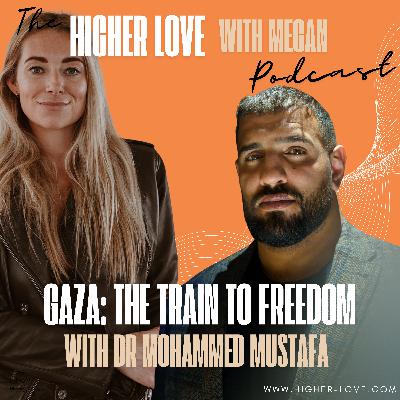Discover Higher Love with Megan
Higher Love with Megan

Higher Love with Megan
Author: Megan Cooper
Subscribed: 6Played: 152Subscribe
Share
© Megan Cooper
Description
Top 5% Spotify Most Shared Podcasts, the Higher Love with Megan Podcast is not just another 'nice-to-have' wellness podcast. It is a disruptive challenge to the status quo, breaking out of the echo chamber of societal narratives within wellness and beyond. Join me, your host, Megan Cooper, a trauma-informed therapist and coach, as we foster an inclusive, diverse space that stands for higher love for all. Through thought-provoking, bold conversations that reunite wellness with social justice and activism, we remember our collective humanity and stand together as ambassadors for change.
107 Episodes
Reverse
In this conversation, Megan Cooper hosts past guests Kaia Allen-Bevan and Viv Grant, who together share their personal and professional experiences around education. Kaia and Viv describe how their own personal experiences as students catalysed their journeys into education, with Viv being the youngest head teacher in the UK turned founder and director of Integrity Coaching, supporting school heads and senior teachers and Kaia founding Youth the Gap CIC. They delve into the challenges and complexities of the educational system, the importance of inner work for leadership, and the collective responsibility to address systemic harm. The discussion emphasises the need for long-term allyship, unity, and a long-term commitment to anti-racist work in schools, while also reflecting on the coexistence of grief and joy, discomfort and hope.Chapters00:00 Introduction and Backgrounds03:39 Feelings About Education06:53 Experiences as Students17:23 Inspiration for Current Work20:22 Leading Change in Education26:30 Resistance and Systemic Harm29:28 Vision for a Liberated Education34:55 Awakening to Unity and Resistance36:23 Defining Anti-Racist Work in Education39:32 Youth the Gap: Transforming School Ecosystems41:49 Pro Stewarding the Future: Legacy in Education46:29 Belonging and Justice in Education49:59 Walking in the Dark: Navigating Uncertainty54:44 Invitations to Inner Wisdom and Hope56:55 OutroAbout Kaia:Kaia Allen-Bevan is a multi-award winning activist, founder of Youth The Gap and director at Edge of Difference, creative and host, recognised by Forbes and Business Today as making a 'global impact' Kaia invites us all to be comfortably uncomfortable in addressing injustice, and not just leaving it all up to the 'activists' to spark long-term and meaningful change.@kaia.ab@youththegapAbout Viv:Viv Grant is an Executive Coach, author and public speaker known for her deep insights into leadership, vulnerability and resilience. She is the Director of Integrity Coaching, London's leading provider in coaching services for Headteachers and Senior School Leaders.https://www.integritycoaching.co.uk/> Please take a moment to leave a rating or review.You can get in touch with Megan atwww.higher-love.com@higherlove_withmegan
This week I am joined by masculinities educator Lewis Wedlock. Together we explore the complexities of masculinity, the impact of patriarchy, and the importance of self-care in activism. Lewis discusses the roots of his advocacy for men's wellbeing and the need to address systemic issues like misogyny and violence against women. We delve into the 'Not All Men' debate, emphasising the importance of accountability and the need for men to engage in conversations about masculinity, feminism and equity in order for us to build better communities and better futures.Chapters00:00 Introduction to Lewis Wedlock01:26 Lewis's Journey into Masculinities Education06:34 Understanding the Impact of Patriarchy07:14 The Role of Men in Addressing Loneliness09:48 Exploring Hyper-Patriarchy and Its Effects12:13 Navigating Pushback in Conversations15:02 Creating Safe Spaces for Discussion16:05 The 'Not All Men' Debate20:41 Embracing Complexity in Masculinity26:14 Encouraging Men to Step Up30:20 Confronting Bias and Discomfort31:39 Creating Safety in Conversations33:54 Addressing Violence Against Women39:50 Navigating Masculinity and Feminism50:02 Sustaining Hope in Activism54:08 Resources for Further Learning59:00 OutroAbout LewisLewis Wedlock is a masculinities educator specialising in person centered, culturally attuned deliveries and interventions. He has spent the last five years working with thousands of young men across the UK in secondary and higher education, engaging them in topics such as feminism, allyship, accountability, sexism, misogyny and VAWG. He has designed and delivered several interventions for schools looking to transform their masculinity school cultures and has worked with thousands of educators to support and empower young men within their school spaces. His debut book “Masculinities in Schools” was published by Sage in 2025.Lewis’s podcast: https://open.spotify.com/show/1ChVU9ZIBqJCuXvfmgc0xuLewis’s Youtube: https://www.youtube.com/@LewisWedlockWebsite: www.lewiswedlock.com LinkedIn: www.linkedin.com/in/lewis-wedlock/Men's Work: www.lewiswedlock.com/mensworkSocials: @lewiswedlock on Instagram and TikTok
ANDDD we're back! After a January hiatus, the Higher Love with Megan Podcast returns to usher in a new year. And we are kick-starting 2026 with Zack Alexander. In this episode, Zack and I explore the tumultuous landscape of 2026 so far, reflecting on the disillusionment of 2025 and the collapse of false structures in society. We discuss the intersection of spirituality and politics, the challenges of navigating identity and activism, and the impact of global events on personal perspectives. Zack shares his journey from the wellness industry to a more politically aware stance, emphasising the importance of listening to diverse voices and the role of anger and grief in healing. The conversation culminates in a discussion about hope amidst chaos and the collective growth needed to create a better future.TIMESTAMPS:00:00 Introduction and Setting the Stage01:52 Reflections on 2026: A Year of Change05:09 Zack's Journey: From Law to Spirituality09:29 The Intersection of Spirituality and Activism17:12 The Impact of Geopolitical Events on Personal Values21:59 Navigating the Complexities of Identity and Trauma30:41 Privilege and Spiritual Constructs34:50 The Need for Maturity in Wellness53:41 Social Media's Impact on Discourse54:02 Cultivating Hope in Challenging Times57:30 OutroAbout Zack: Zack is a Spiritual and Leadership Mentor, a Jewish mystic weaving together psychology, grounded spirituality, political philosophy, business and leadership into one path. He reflects on what’s often unseen to help others deepen their journey and supports the process of healing through a trauma-informed lens.IG: @iamzackalexanderSubstack: https://zackalexander.substack.com/Please take a moment to RATE, REVIEW and SHARE this episode with anyone who can benefit from the conversation.You can contact me directly via my website www.higher-love.com or find me on IG @higherlove_withmegan
In this special edition of Higher Love with Megan, I look back at the podcasts past and present as we draw this year to a close. When I relaunched this podcast 18 months ago, my intention was to host the conversations I felt were most missing from the wellbeing space, taking listeners on a journey to learn, unlearn and grow together.This episode is a celebration of that shared journey. I revisit some of the most powerful moments from the last year, featuring voices that have challenged us to redefine what it means to be well in an unwell world. From the moral clarity of Misan Harriman to the bravery of Dr Mo Mustafa in Gaza, and the enduring spirit of Holocaust survivor Stephen Kapos, this compilation highlights our collective commitment to standing together in solidarity.Key TakeawaysA Hunger for Change: The significant growth in the podcast’s audience demonstrates how hungry we are as a community for change at a time when despair can feel close.Co-creation and Community: This podcast is a collaboration and a symbiotic co-creation between guest, host, production and listener, embodying our shared collective humanity.Redefining Wellness: We are moving away from the silence often found in spiritual spaces and acknowledging that the highest iteration of spirituality involves speaking out against injustice.Interconnected Struggles: The genocide in Palestine has shone a light on wider systems of harm, including imperialism and capitalism, revealing how our struggles and our liberation are inextricably intertwined.Episode Highlights04:00 – Dina Ghandour and Charles Myssey discuss the shock of silence within the wellness industry and the fallacy of ‘love and light’ bypassing.07:40 – Misan Harriman reflects on the power of protest photography as an act of resistance and the importance of a clear conscience.10:30 – Dr Mo Mustafa, Jen Brister and Georgia Takacs share insights on the bravery of medical workers in Gaza and the necessity of getting uncomfortable for the sake of humanity.14:30 – Kieran Andrieu describes the emotional departure of the Freedom Flotilla and the tectonic shift in global solidarity for Palestine.19:00 – 88-year-old Holocaust survivor Stephen Kapos and his daughter Andrea discuss his newfound 'celebrity' status as an activist.About the guestsThis episode features a collection of guests from throughout the year, including:Dina Ghandour & Charles Myssy: Practitioners and guides.Misan Harriman: Photographer and activist.Dr Mo Mustafa: Doctor and humanitarian.Jen Brister & Georgia Takacs: Founders of All Our Relations.Kieran Andrieu: Journalist and commentator for Novara Media.Antoine Raffoul & Yasmin Say: Palestinian voices and storytellers.Stephen & Andrea Kapos: Holocaust survivor and filmmaker.Marina Purkiss: Political commentator.Khaled Abdalla: Actor and activist.About MeganInstagram: @HigherLove_withMeganWebsite: www.higher-love.comThis episode was written and recorded by me and produced by Lucy Lucraft (http://lucylucraft.co.uk ).If you enjoyed this episode please leave a 5* rating and review.
In this episode, I am honoured to welcome Ashira Darwish, a Palestinian healer and former journalist who I first encountered through the film Where Olive Trees Weep. We have a raw and necessary conversation about the reality of the last two years for Palestinians, discussing how the ongoing genocide has shattered illusions about Western institutions, international law and the concept of justice.Ashira shares her journey from working in the media—and witnessing its complicity in dehumanisation—to becoming a healer. We explore the limitations of Western therapeutic models that isolate the individual from their community and spiritual roots, and she offers a powerful perspective on how true resilience is found in the collective and the divine.Decolonising the Mind: Ashira explains that living under occupation also means living under indoctrination. She describes the painful but necessary process of losing faith in Western systems and realizing that liberation begins with decolonising our own beliefs.The Failure of Western Media: Drawing on her background as a journalist and fixer, Ashira argues that impartiality is impossible during a genocide. She discusses how mainstream outlets have been complicit in spreading propaganda and dehumanising Palestinians.Healing is Collective: We discuss why Western therapy often fails by treating trauma as an individual disorder rather than a symptom of a sick society. Ashira advocates for healing that integrates the body, spirit, and tribe, rather than isolating the individual.Silence is Complicity: Ashira critiques spiritual leaders and the wellness industry for bypassing the reality of genocide. She emphasizes that you cannot claim to be for love and healing while remaining silent when humanity is under attack.03:43 – Ashira discusses the process of decolonising her mind and the collapse of her belief in Western human rights institutions.16:00 – How the resistance of the people in Gaza has beaten the algorithm and awakened global consciousness.23:00 – A critique of 'impartiality' in journalism and the complicity of media outlets in the violence.36:00 – Why the separation of mothers and children in capitalist societies creates trauma and how indigenous tribal structures offer a healthier alternative.59:00 – The spiritual bypassing within the wellness industry and the necessity of taking action to stop genocide.Ashira Darwish is a Palestinian therapist, researcher and founder of Catharsis Holistic Healing. A former journalist and TV & radio producer, she spent 15 years working in the media before turning to healing work. She is the creator of the AIDA Active Meditation modality and works to support trauma healing within the Palestinian community.Instagram: @ashiradarwishWebsite: Catharsis Holistic HealingCourse: School of Radical ImaginationInstagram: @HigherLove_withMeganWebsite: www.higher-love.comThis episode was written and recorded by me and produced by Lucy Lucraft (http://lucylucraft.co.uk )If you enjoyed this episode please leave a 5* rating and review.Key TakeawaysEpisode HighlightsAbout the GuestConnect with Megan
In this episode, I sit down with the actor and activist Khalid Abdalla. Known for his roles in The Kite Runner and as Dodi Fayed in The Crown, Khaled joins me for a conversation that is as raw as it is necessary. We recorded this shortly after he received news of the passing of a cherished colleague and on-screen father, bringing a palpable sense of vulnerability to the space.Together, we explore the intersection of artistry and political struggle. Khaled reflects on his background as an actor of Arab descent, his involvement in the Egyptian Revolution, and the deep responsibility he feels to speak out against the ongoing violence in Gaza. We discuss the complexities of representation, the shift from professional solitude to collective solidarity, and why maintaining hope is a disciplined, communal act.Key TakeawaysThe Artist as Witness: Khaled discusses the evolution of his career, from graduating during the Iraq War to his current activism. He articulates why artists cannot remain neutral and how creative forms—whether film, writing, or music—must adapt to meet the political urgency of the moment.Representation Matters: We touch on the cultural significance of his role as Dodi Fayed in The Crown. Khaled explains how playing a character the audience is encouraged to love and mourn, rather than fear, challenges decades of harmful tropes regarding Arab identity in Western media.From Solitude to Solidarity: A central theme of our conversation is the journey from feeling isolated in speaking out to finding a vast, supportive community. Khaled shares how stepping past the fear of professional risk revealed unexpected circles of solidarity.The Non-Linearity of Change: Drawing on historical examples, such as the Dunnes Stores strike against apartheid, Khaled reminds us that small, seemingly impossible acts of resistance can ripple out to create monumental shifts over time.Episode Highlights01:45 – Khaled shares the grief he is carrying into the space following the loss of a revered colleague and on-screen father.07:50 – Reflections on playing Dodi Fayed and the rare opportunity to portray an Arab character that invites love rather than fear.16:00 – The initial loneliness of speaking out against the genocide in Gaza and the subsequent discovery of global solidarity.26:40 – Khaled discusses the painful conditioning of accepting the loss of Arab lives and the refusal to accept this for future generations.45:30 – A powerful story about the Dunnes Stores strike in Dublin and how a single grapefruit became a symbol of anti-apartheid resistance.About the GuestKhaled Abdalla is a British-Egyptian actor and activist. He gained international recognition for his role in the Academy Award-nominated film The Kite Runner. More recently, he portrayed Dodi Fayed in the Netflix series The Crown. Beyond the screen, Khaled is a prominent voice in social justice movements, having been deeply involved in the 2011 Egyptian Revolution and current solidarity campaigns for Palestine.Instagram: @khaledabdallaEpisode LinksThe Kite Runner (Film)The Crown (Netflix Series)Nowhere (Play by Khaled Abdalla) Workers for a Free Palestine / Film Workers Pledge Connect with MeganInstagram: @HigherLove_withMeganWebsite: www.higher-love.comThis episode was written and recorded by me and produced by Lucy Lucraft (http://lucylucraft.co.uk )If you enjoyed this episode please leave a 5* rating and review.
In this milestone 100th episode, I am honoured to be joined by 88-year-old Stephen Kapos and his daughter, filmmaker Andrea Kapos. Stephen, a child survivor of the Holocaust, has recently found himself in the public eye as a vocal activist for Palestinian solidarity. Together, we explore Stephen's journey from a retired architect to a prominent voice at protest marches, where he speaks as a witness to history to challenge current narratives. We discuss the powerful intergenerational bond formed through their shared activism and the documentary Andrea is currently filming to preserve these vital testimonies.Key TakeawaysThe duty to bear witness: Stephen believes his role is critical because there are very few remaining survivors with actual memories of the Holocaust who can speak to the realities of persecution and genocide.Intergenerational activism: For the Kapos family, attending marches and speaking out has become a shared experience involving Stephen, Andrea, and even Stephen's grandchildren, creating a deep sense of solidarity and pride.Distinguishing Judaism from Zionism: Stephen articulates his view that conflating Jewish identity with Zionism is dangerous and incorrect, noting that he views the actions of the Israeli state as contrary to his understanding of Jewish valuesHope as action: Andrea reflects that hope is not a passive state but a "doing word" found in the act of gathering, marching, and refusing to be a bystander to history.Episode Highlights00:03:00 Stephen discusses the warm reception he receives at marches and his response to the few detractors he encounters.00:16:00 Transitioning from a career in architecture to becoming a public speaker and witness in his late eighties.00:32:00 Stephen explains why he believes Palestinian solidarity and anti-Zionism are distinct from antisemitism.00:51:00 The emotional experience of the 'Choose Love' event, where Stephen witnessed the reading of the names of children killed in Gaza.01:05:00 Thoughts on why hope is found in the "doing" and the importance of the growing international movement.About the GuestsStephen Kapos is an 88-year-old survivor of the Holocaust from Budapest who has become a dedicated activist for Palestinian rights. He is a member of the group Holocaust Survivors and Descendants Against the Genocide in Gaza.Andrea Kapos is a documentary filmmaker and Stephen's daughter. She is currently producing a film chronicling the lives and meeting of her father and fellow survivor Antoine, exploring their parallel histories and shared solidarity.Episode LinksHolocaust Survivors and Descendants Against the Genocide in Gaza Double Down News Stop the War Coalition Misan Harriman (Photographer mentioned regarding the 'Choose Love' event and portraits) Cafe PalestinaConnect with MeganInstagram: @HigherLove_withMeganWebsite: www.higher-love.comThis episode was written and recorded by me and produced by Lucy Lucraft (lucylucraft.co.uk)If you enjoyed this episode please leave a 5* rating and review.
I had a brilliant conversation with Marina Purkiss, a political commentator known for her straight-talking, highly opinionated perspective on current affairs. Marina shared how her political journey began by simply putting out tweets, which grew into a large platform.We discussed how political apathy is a privilege , and for many, including Marina, the Brexit referendum was the wake-up call that made politics impossible to ignore. Marina opens up about the challenges of political commentary, from being threatened with lawsuits to dealing with the chilling online abuse and sexism, particularly the vitriol directed at women. She expresses the deep rage she feels over the hypocrisy and incompetence of bad actors in politics. We also delve into the necessity of women bringing their true selves to power, and the importance of community and catharsis—like that found in her podcast, The Trawl—to manage the mental toll of being engaged in an overwhelming world.📌 Episode Highlights04:59 On the shift from political apathy to engagement: "I feel like we're in this point in time where it's just I can't look away".09:49 Marina shares that as her platform grew, she became less reckless and more cautious due to multiple threats of lawsuits and people disingenuously twisting her words12:28 Discussing the chilling backlash received on a tweet promoting humanity, which caused Marina to worry for her own safety and delete the post.18:50 Marina speaks to the perception that she must convince people she knows what she's talking about because of her appearance, highlighting the unconscious bias in the space.25:11 Expressing her deep rage over the hypocrisy and brazen corruption of politicians who bend over backwards for international interests over their own citizens.28:55 Acknowledging an unhealthy approach to dealing with rage, including having "constant adrenaline" and needing a glass of wine to slow down the nervous system.33:04 Finding hope in the rise of the Green Party and the fact that the "mask is slipping" for other parties, allowing truth to come out.37:57 Encouraging people new to politics to not worry about missteps and to seek information from credible, non-billionaire-backed sources like Byline Times or The New European👤 About the Guest: Marina PurkissMarina Purkiss is a political commentator, writer, and co-host of The Trawl podcast. She also maintains a full-time tech marketing career.The Trawl Podcast: Social Media: Please search for Marina Purkiss on social media.🔗 Episode links: The Trawl Podcast: Co-hosted by Marina Purkiss and Jemma Forte.Byline Times: News publication recommended for informed reading.The New European: News publication (now called New World) recommended for informed readingCarol Cadwallah, Ash Sarkar, Politics Joe: Writers and organisations recommended for political commentaryConnect with Megan:Instagram: @HigherLove_withMeganWebsite: www.higher-love.comThis episode was written and recorded by me and produced by Lucy Lucraft (lucylucraft.co.uk)If you enjoyed this episode please leave a 5* rating and review!Would you like me to share more details about The Trawl podcast?
I had the profound honour of sitting down with Kieran Andrieu, a journalist with Novara Media and an academic with a background in macroeconomics and politics. Kieran recently returned from the Gaza Freedom Flotilla, where his vessel was illegally intercepted and he was detained in an Israeli prison.Kieran, who is half-Palestinian, shared his deeply personal connection to the struggle for liberation and the immense emotional shift of witnessing a huge increase in mainstream solidarity compared to his childhood. We discuss: The Power of Visibility and SolidarityConfronting Moral InjuryIsraeli Ideological IsolationDefiance Against Political TheatreDirect Action is Crucial Now08:55 The profound tectonic shift in public sentiment and discourse around the Palestinian struggle.14:38 The incredibly emotional experience of watching people across all identities unite to wave the Flotilla off from Barcelona.26:50 Kieran recounts the surreal moment of kneeling in the port and seeing far-right Minister Itamar Ben-Gvir arrive with an entourage for political theatre.37:09 The shocking discovery that Israeli functionaries were completely intellectually uncurious and surprisingly ignorant, with one not even knowing what Norway was.47:11 The harrowing realisation that the prison he was taken to, Ketziot, was the same one where his younger brother was imprisoned and tortured as a boy.54:33 Discussing the BBC's debasement of its reputation by siding with the Israeli line, such as suggesting a drone attack was a "cigarette fire".01:03:07 The long-term strategy for Palestinian freedom: focusing on the internal collapse of Israel as a Zionist ethno-supremacist project, accelerated by international pressure.Kieran Andrieu is a journalist with Novara Media, and an academic by trade, who has recently been on the Gaza Freedom Flotilla.Instagram: Please search for Kieran Andrieu on Instagram.Twitter/X: Please search for Kieran Andrieu on Twitter/X.Novara Media: Kieran has worked as a journalist and political commentator for Novara Media.Novara Media Downstream Episode: Kidnapped at Sea by the Israeli Military (Kieran's blow-by-blow account of the interception)The Voice of Hind Rajab:Connect with Megan:Instagram: @HigherLove_withMeganWebsite: www.higher-love.comThis episode was written and recorded by me and produced by Lucy Lucraft (http://lucylucraft.co.uk )If you enjoyed this episode please leave a 5* rating and review!📌 Episode Highlights👤 About the Guest: Kieran Andrieu🔗 Episode links: Resources Mentioned맺 End Credits
I was joined by the incredible activist, Kaia Allen-Bevan, to discuss the deeply interconnected nature of social justice, education, and wellness. Kaia, who identifies first and foremost as an activist specialising in racial justice and racial equity, shared her insights on how systems of oppression are perpetuated and how we can work towards collective liberation.We delve into the quietest Black History Month in five years , why activism and social justice cease to be "trendy" and the essential nature of intersectionality when discussing global struggles like those in Congo, Sudan, and Palestine. Kaia powerfully unpacks the colonial structures embedded in the education system , and we discuss how wellness has been co-opted by capitalism and white supremacy6666. Crucially, Kaia highlights the importance of radical hope and community action as tools for genuine resistance against systems designed to foster despair and isolation.🔑 Key TakeawaysSocial Justice is Interconnected: Global struggles for liberation, such as those in Congo, Sudan, and Palestine, are deeply connected by the actions of bigger powers and the global north exploiting the global south. Education is Not Neutral: Education systems were set up to manufacture compliant workers and uphold a social hierarchy, not necessarily to inspire dreams or critical thinking. Wellness Must Be Decolonised: Wellness defined by indulgence, consumption, and white, thin bodies is merely capitalism. Hope is an Act of Resistance: The empire actively tries to shut down hope to make people susceptible to propaganda and opt out of change. Confronting Fragility is Essential: Progress in social justice requires confronting personal fragility—be it white fragility or discomfort—by sitting with the resulting emotions. 📌 Episode Highlights03:51 The reason Black History Month felt quietest in five years is because it is "no longer trendy" after the global phenomenon of the BLM movement plateaued.04:36 Kaia explains how the disconnection from the ongoing picture of revolution and the lack of immediate gratification caused engagement with the movement to drop.07:44 Discussing the interconnectedness of global struggles: the liberation of Congo and Sudan is linked to the liberation of Palestine.23:25 Kaia's definition of wellbeing: not looking away from the world's injustices, but being well enough to show up to the fullest and take informed action.37:05 Challenging the "higher self" or "best version of yourself" narrative, which is often a cog in the wheel of capitalism that creates a sense of inadequacy.44:59 Kaia defines and discusses the necessity of confronting white fragility to navigate conversations about racial injustice.👤 About the Guest: Kaia Allen-BevanKaia Allen-Bevan is an activist specialising in racial justice and racial equity, working with schools, youth, and through diversity and inclusion consultancy. She is also a trustee and creative.Instagram: @kaia.ab LinkedIn: Kaia Allen-Bevan https://youththegap.uk/https://edgeofdifference.com/🔗 Episode Links: Resources MentionedTEDx Talk: Kaia's TEDx talk on decolonising revolution Fernando Deveras: Educator and advocate Kimberlé Crenshaw: Coined the term "intersectionality" in 1989 audre Lorde: Writer, activist, and quoted on the importance of self-care and practices as resistance맺 End CreditsConnect with Megan:Instagram: @HigherLove_withMeganWebsite: www.higher-love.comThis episode was written and recorded by me and produced by Lucy Lucraft (http://lucylucraft.co.uk )If you enjoyed this episode please leave a 5* rating and review!Would you like me to find out more about any of the resources or people mentioned in the show notes?
I was truly grateful to welcome Charles Myssy, founder of the Shadow Mastery Institute and a spiritual satirist, to the show. We delved into his profound work on shadow integration, his use of the trickster archetype to challenge the spiritual ego, and his recent shift toward discussing urgent global issues. Charles, who is based in Australia and has Lebanese heritage, shared his journey of reclaiming his cultural identity, confronting internalised shame, and understanding the intergenerational trauma passed down through his family, which survived genocide and civil war.Our conversation evolved into a crucial discussion about spiritual bypassing, the activation of the warrior archetype in response to collective trauma, and the imperative for the wellness community to move from personal healing to collective spiritual revolution.Key Takeaways:The Role of the Trickster: Spiritual satire, or the trickster archetype, is essential for challenging an inflated ego.Healing Intergenerational Trauma: Individual healing can involve reclaiming suppressed parts of our identity.Challenging Spiritual Bypassing: The belief that collective problems can be solved purely through 'praying for peace' and 'love and light' is often a form of spiritual bypassing and delusion.The Future of Wellness: A mature, authentic, and potent era of wellness and spirituality will reject the age of gurus.Episode Highlights:01:45: Charles introduces his work, including running shadow integration retreats, founding the Shadow Mastery Institute, and his 'Shadow Alchemy' workshop tour around Australia.03:19: Discussion on the trickster archetype's function to laugh at ourselves, keep the ego grounded, and unveil shadowy attachments within the spiritual community.09:47: Charles shares his personal journey of confronting the internalized shame of his Lebanese heritage and reclaiming his identity, linking this to understanding intergenerational trauma and historical conflicts14:55: Discussion on the intergenerational trauma loop in the Middle East and how Charles had to deprogram prejudice towards different groups to observe the situation with clarity.20:53: The shift in focus and the activation of the warrior archetype (discernment and protection) in response to global events, and the necessity to challenge the 'love and light bubble'.27:54: Exploring what is missing in the spiritual space and the necessary leap from personal healing to a collective spiritual revolution, incorporating archetypes like the Warrior and Magician.35:05: Charles expresses his strong view against the idea of 'praying away' collective problems and the necessity of confrontation, especially when faced with injustice.About the Guest:Charles Myssy is the founder of the Shadow Mastery Institute and a teacher/mentor focusing on shadow integration, inner work, and healing. He is also known for his spiritual satire.Instagram: @charlesmyssyConnect with Megan:Instagram: @HigherLove_withMeganWebsite: www.higher-love.comThis episode was written and recorded by me and produced by Lucy Lucraft (http://lucylucraft.co.uk )If you enjoyed this episode please leave a 5* rating and review!
In this deeply moving episode, I have the honour of speaking with Antoine, a survivor of the 1948 Nakba, and his daughter, Yasmine. Recording on the anniversary of October 7th, we contextualise the current genocide in Gaza not as an isolated event, but as the continuation of an incremental process of erasure that has unfolded over the last 77 years.Antoine shares his personal story of being exiled from his home in Haifa at age seven , and his father’s determination for his children to become "citizens of the world, not refugees". Yasmin speaks to the generational differences in activism, the profound impact of social media in shifting global consciousness, and how becoming a mother has fuelled her fierce advocacy for Palestine. This conversation is a powerful exploration of Palestinian history, identity, resilience, and the unwavering hope for a free and democratic future for all.Key TakeawaysThe current genocide in Gaza is not a recent conflict but the culmination of a 77-year incremental process of displacement and erasure of the Palestinian people that began with the 1948 Nakba.Social media has been fundamental in exposing the reality of the Palestinian struggle to a global audience.There is a significant generational difference in experiencing and processing the struggle. The vision for a "one-state solution" from a Palestinian perspective is an inclusive, democratic state in historic Palestine where all 14 million inhabitants, including returning refugees, can live with equal rights.Episode Highlights01:08: Antoine contextualises the current genocide within the 77-year history since the 1948 Nakba, sharing harrowing statistics from the last two years15:59: Antoine shares his personal story of being exiled from Haifa at age seven during the Nakba and his family’s journey north on the back of a truck23:08: Yasmine recounts how her Palestinian heritage influenced her university dissertation, which challenged Golda Meir's claim that the Palestinian people never existed, and questions if such a project would be permitted today01:01:04: Yasmine speaks powerfully about how motherhood has shaped her fierce advocacy and her sadness at the silence from the wider motherhood community in the face of atrocities against Palestinian children and familiesAbout the GuestThis episode features Antoine, a Nakba survivor and retired architect, and his daughter Yasmin, a passionate advocate and activist for Palestine.Antoine's Instagram: https://www.instagram.com/antoineraffoul/?hl=enYasmin's Instagram: https://www.instagram.com/sayfitnessptEpisode LinksIlan Pappé (Israeli historian)Salman Abu Sitta (Historian and author)Ghassan Kanafani (Palestinian writer)Ta-Nehisi Coates (Author and journalist)Children Not Numbers Yasmin's YouTube interview with her father, Antoine Connect with Megan:Instagram: @HigherLove_withMeganWebsite: www.higher-love.comThis episode was written and recorded by me and produced by Lucy Lucraft (lucylucraft.co.uk).If you enjoyed this episode please leave a 5* rating and review!
In this episode, I speak with "Marnie" (pseudonym for security reasons) who recently returned from volunteering in the West Bank with the International Solidarity Movement (ISM). Marnie shares her firsthand account of providing protective presence and solidarity to Palestinian families in the Jordan Valley. She describes the daily realities of the occupation, from the psychological impact of checkpoints and a constant military presence to the sharp increase in settler violence since October 7th 2023.We explore the incredible steadfastness ("Sumud") and community resilience of Palestinians, the complexities of non-violent resistance, and the crucial role of international solidarity in bearing witness and supporting the struggle for liberation.Key Takeaways:Life in the West Bank is characterised by a constant state of hyper-vigilance due to the omnipresent threat of settler and military violence, which functions as a form of psychological warfare. Since October 7th, Israel has used the focus on Gaza as a distraction to significantly increase violence, harassment, home demolitions, and land displacement in the West Bank. Palestinian resistance is deeply rooted in steadfastness (SUmud) and an incredible sense of community and mutual aid, where survival and liberation are intrinsically linked. The role of international activists is not to lead or instruct, but to be Palestinian-led, offering solidarity, documenting events, and providing a protective presence that may help deter attacks. Episode Highlights:05:29: Marnie describes her initial experiences of the occupation, witnessing militarised checkpoints, the separation wall, and a surreal encounter with a heavily armed young soldier on a public bus. 10:18: An explanation of how Israel is using Gaza as a 'distraction' to intensify attacks, annex land, and displace communities in the West Bank by establishing settlements, outposts, and closed military zones. 24:08: Marnie discusses the concept of Palestinian steadfastness, or Samud, and the powerful resilience and community spirit she witnessed, which stands in stark contrast to the constant psychological pressure of the occupation. 33:40: Marnie explains ISM's core principle of non-violence for internationals, while simultaneously stressing the importance of never telling Palestinians how to conduct their own resistance. Connect with Megan:Instagram: @HigherLove_withMeganWebsite: www.higher-love.comThis episode was written and recorded by me and produced by Lucy Lucraft (http://lucylucraft.co.uk )If you enjoyed this episode please leave a 5* rating and review!
In this RELOADED episode, I speak with educator and father, Fernando Deveras, about the fundamental importance of collaboration and community in fostering human progress. Fernando shares his perspective on how we have moved from a collective species to an individualised one, and how systems can benefit from this alienation. We discuss the power of focusing on shared values to create collective change and the relief that comes from deconditioning from the pressure to have all the answers.Fernando also offers his invaluable experience as an educator and a parent on how to approach difficult conversations with children about complex global and local issues, from poverty and systemic injustice to war and politics. This is a powerful conversation about humanising our discourse, taking responsibility for the knowledge we share, and building a more connected and informed world, one conversation at a time.Listen to the previous episodes with Fernandas below: - Where are the men?- Why my liberation is bound with yoursKey takeaways: Humanity’s strength is in collaboration; our progress as a species is rooted in our ability to work together, a collective nature that has been fragmented by systems that benefit from our alienation. For effective collective change, focusing on shared values and a common vision is more productive than getting caught up in differing methods or opinions. When discussing difficult topics with children, it is crucial to distinguish between what you want them to know and what they need to know to navigate their world, considering their age, emotional maturity, and the potential weight of the information. A vital part of this work involves actively humanising people who are often dehumanised by political rhetoric, reminding ourselves and others of our shared humanity. Episode highlights: 02:00 The simple but profound power of returning to community and connection as the solution. 03:00 How systems benefit from alienating people, using labour union organising as an example.08:00 Key questions for parents: Does my child need to know this? Will this information weigh them down? 11:00 Our responsibility to share knowledge and different perspectives to enrich our collective understanding. About the guestFernando Deveras is an educator, parent, and advocate for social change. With a background as a middle school teacher, he focuses on creating resources and conversations that help both adults and children understand and navigate the complexities of our world with compassion and critical awareness.Instagram: @fernandodeverasWebsite: https://latinxparenting.thrivecart.comConnect with Megan: Instagram: @HigherLove_withMeganWebsite: www.higher-love.comThis episode was written and recorded by me and produced by Lucy Lucraft (lucylucraft.co.uk) If you enjoyed this episode please leave a 5* rating and review!
In this urgent and timely episode, I am joined by Mary, the national lead for the UK delegation of the Global Sumud Flotilla. Mary provides a direct update on the recent drone strike against one of the ships and shares the core objectives of this nonviolent humanitarian mission. We discuss the international legal context surrounding the flotilla, the historical significance of this action, and why ordinary citizens are stepping up where governments have failed. This conversation is a crucial resource for understanding what is happening at sea and how we, as a global community, can support the call to end the siege on Gaza.Key Takeaways: A Nonviolent Mission: The flotilla is an unarmed, nonviolent, citizen-led mission with three clear aims: to break the illegal siege of Gaza, open a humanitarian corridor for aid, and call for an end to the genocide. Government Inaction: The mission is a direct response to the inaction of world governments to uphold international law and protect civilian life in Gaza. The Power of Ordinary People: The flotilla is comprised of ordinary citizens from around the world, including builders, nurses, and accountants, who are putting their bodies on the line to stand for our collective humanity. Upholding International Law: The naval blockade imposed by Israel on Gaza is unlawful. The flotilla operates with the legal right to deliver aid to a starving population, challenging the dangerous precedent set by ignoring international maritime laws. Episode highlights:02:41: Mary provides an update on the drone strike that hit the family ship.05:41: An outline of the flotilla's three main objectives.13:46: The historical context of this flotilla as a continuum of an 18-year maritime effort to break the siege. 919:25: A breakdown of the international legal right for this humanitarian mission to sail to Gaza.30:35: Mary details the tangible actions listeners can take to support the mission from home.About the guest: Mary is the national lead for the UK delegation of the Global Sumud Flotilla. She has been involved in work around Palestine for many years. Website: Freedom Flotilla CoalitionInstagram: @freedomflotillaPalestine Solidarity Campaign (PSC)Connect with Megan: Instagram: @HigherLove_withMeganWebsite: www.higher-love.comThis episode was written and recorded by me and produced by Lucy Lucraft (lucylucraft.co.uk)If you enjoyed this episode please leave a 5* rating and review.
In this episode, I have a powerful and moving conversation with the wonderful Illiyin Morrison. Illiyin is a midwife, author, and birth debrief facilitator who specialises in processing difficult and traumatic perinatal experiences. We explore the crucial difference between being 'nice' and being 'kind,' and why she doesn't care about being liked. Illiyin shares her personal birth experiences, how they became a catalyst for her work, and her mission to change the narrative around birth from a passive experience to one of active participation. We also discuss the crisis of apathy, the vital role of community, and why the silence from many maternal spaces on global issues is not surprising, but is rooted in capitalism and a conditioned desire for palatability.Key Takeaways:Kindness Over Niceness: Niceness can be a currency used to conform and remain compliant. Kindness, however, is about being generous and well-intentioned, and doesn't require you to be palatable to the status quo. Active Participation in Birth: It's important to shift the narrative from birth being something that happens to you, to something that happens with you. Recognising your own power and agency is key to being an active participant in your own perinatal experiences. The Antidote to Apathy is Community: Society's glorification of individualism can lead to apathy. The antidote is to connect with community, which stimulates empathy, compassion, and a collective force for change that is feared by those in power. Privilege and Selective Empathy: The reluctance of some mothers to engage with global suffering is a form of privilege. We are capable of handling more than we've been told, and exposing ourselves to the reality of others' pain is how we develop compassion, empathy and humanity. Episode Highlights10:00: Illyin explains the difference between being kind and being nice, describing "niceness" as a currency that keeps people compliant. 11:00: Illyin speaks to the unspoken promise adults make to children to provide physical, emotional, and mental safety for them to develop. 18:00: Challenging the narrative that birth is something that happens to us, and instead viewing it as a process we are active participants in. 28:00: Illyin discusses why many in the 'birth business' have remained silent on global atrocities, linking it to capitalism and the need to remain palatable to sustain their income. 39:00: The glorification of individualism intentionally creates a society of selfish goals; the antidote to the resulting apathy is finding community. About the Guest:Illyin Morrison is a midwife, author of The Birth Debrief, and a birth debrief facilitator. She helps people process difficult perinatal experiences and also ventures into grief processing. You may also recognise her from the Great British Bake Off.Instagram: @illyin_morrisonWebsite: mixingboil.comConnect with Megan:Instagram: @HigherLove_withMeganWebsite: www.higher-love.comThis episode was written and recorded by me and produced by Lucy Lucraft (lucylucraft.co.uk)If you enjoyed this episode please leave a 5* rating and review!
This week's episode is recorded with Olive Gray, the Protecting Children in Crisis Squad Lead at Save the Children UK.In this episode we discuss the dire humanitarian situation in Gaza, where children are facing extreme physical, mental and emotional distress and starvation due to ongoing escalation of the past 22 months. Olive highlights the organisation's efforts to provide essential support, including mental health services and advocacy for children's rights. She emphasises the importance of public mobilisation and government accountability in addressing the crisis and campaigns conducted by Save the Children UK at this time. She also shares her personal experiences of the need to prioritise physical, mental and emotional wellbeing as campaigners and advocates for global issues. The conversation concludes with a message of hope and the call for continued action to support the children of Palestine.About Olive Gray: Olive Gray works at Save the Children UK as the Protecting Children in Crisis Squad Lead, leading their campaigns for children in the occupied Palestinian territory.Please visit: www.savethechildren.org.ukIn this conversation:01:28 Introduction to Save the Children and Olive Gray's Role02:45 Current Situation in Gaza: A Humanitarian Crisis06:40 Psychosocial Support for Children and Staff12:00 Campaigning for Palestinian Children's Rights14:52 Public Mobilisation and Advocacy Strategies17:58 Challenges in Campaigning and Public Support19:46 Taking Action: How to Support the Cause23:14 Self-Care in Advocacy Work28:24 Hope Amidst Despair: Finding Motivation32:45 Looking Ahead: The Future for Palestinian Children
In today's episode we're going to do something a little different, by having a core theme that has run through many conversations. This theme is "where are the men?" This is a conversation that was ignited by activist, photographer and film-maker Misan Harriman on his social media last October, which started an ongoing inquiry and exploration behind closed doors with my husband and with other great men who have graced the podcast this year.As a little context, this video by Misan, included at the start of this episode, draws attention to the under-representation of men in a lot of spaces for social change. Certainly those amongst a certain demographic which are in fact the men as Misan puts it, "sit closest to the levers of power". Certainly there are many men notably from black or brown communities or from margnalised identities such as the LGBTQA+ communities advocating for equality and justice and doing incredible work. Yet the question remains of "Where are the men?" especially those of relative comfort, safety and influence. In this episode you'll hear from my husband, Caspar, then from photographer, film-maker and activist Misan Harriman, community-organisers Fernando Deveras and Kevan Smith. I encourage you to listen to each of these individual episodes too:Misan Harriman: "Let's Make Moral Clarity the vibe"Fernando Deveras: "Why Your Liberation is bound with mine"Kevan Smith: "Allyship begins where your comfort zone ends"In this episode:03:58 Misan Harriman's share on "Where are the men?"08:25 In conversation with my husband, Caspar18:27 In conversation with Misan Harriman30:15 In conversation with Fernando Deveras33:46 In conversation with Kevan SmithI'd love to hear what you think and keep this important question going with curiosity and openness.
In this conversation, I speak with Dr. Mohammed Mustafa @beastfromthe_middleeast about the ongoing crisis in Gaza, the urgency of action and the resilience of the Palestinian people who have captured the hearts of the world.Dr. Mustafa shares his experiences serving in Gaza and the ongoing challenges faced by healthcare workers and the importance of ongoing solidarity. He emphasises the need for continued advocacy and his plans for a mobile hospital to support the rebuilding of Gaza's healthcare system. The discussion highlights the growing global movement for Palestine and the power of humanity in the face of oppression.About Dr Mohammed Mustafa:An English-Australian emergency physician trainee and humanitarian of Palestinian heritage, Dr Mo served in Gaza’s Nasser and European hospitals providing critical emergency care amid escalating violence in 2024 and 2025. He returned to Gaza in March of this year, arriving just as a fragile ceasefire collapsed. His raw, live reporting from inside emergency departments brought the scale of the increasing devastation to millions worldwide. Since leaving Gaza, Dr Mo has been advocating tirelessly across countries, connecting with international governments, broadcasters and media platforms to protect the children of Gaza. On other episodes such as The Muslim Pound and Owen Jones Podcast you can hear his personal experiences of providing medical care in Gaza, the likes of which it is almost impossible to comprehend let alone be prepared to experience first-hand. He continuously centres the commitment of Palestinian doctors, nurses and medics, the ones who tirelessly risk their lives every day to do their jobs and who deserve our continual support and solidarity.In this episode:- The urgency for immediate action in Gaza- Dr Mo's experiences in Gaza 2024-25- Healthcare workers in Gaza as the most courageous of those who walk amongst us- Finding what unites us rather than divides us- Media narratives that have continued to dehumanise Palestinians over the decades and the slipping of the propaganda veil- The growing shift in questioning our misinformed views of Muslims, Islam and Arab culture- How Palestinians may be losing daily battles but have won their way into people's hearts due to their courage, grace and resilience amidst such suffering- The inevitability of success in the global movement for Palestine however long it takes- Hope for the future lies in rebuilding and supporting Gaza's healthcare system.- The importance to continue doing what we are doingPlease continue to follow Dr Mohammed Mustafa via his social media and continue to do all you can to support our brothers and sisters in Palestine.Episode Highlights:08:45: The importance of showing grace to people new to the movement who are unlearning decades of propaganda.11:30: Why Gaza is the intersection of major global issues like capitalism, colonialism, human rights, and racism.23:25: How the profound humanity of the Palestinian people has created a global movement of support and love.39:50: A simple piece of advice for everyone: no matter how hopeless you feel, just keep going. Every small action contributes to the tipping of the scales.42:25: The vision for a mobile children's hospital, not just to treat patients, but to rebuild hope, expertise, and the future of Gaza's healthcare system.Connect with Megan:Instagram: @HigherLove_withMeganWebsite: http://www.higher-love.comThis episode was written and recorded by me and produced by Lucy Lucraft (http://lucylucraft.co.uk )If you enjoyed this episode please leave a 5* rating and review
IF YOU MISSED IT THE FIRST TIME, IT'S BACK! A deep dive with Keri Jarvis taken from the full episode we recorded together last summer.In this insightful discussion, Kerry, an intersectional feminist coach and activist, explores the necessity of restructuring societal systems that perpetuate inequality. Reflecting on her journey from motherhood to her current advocacy for intersectionality, Keri addresses the interconnectedness of white supremacy, capitalism and systems of injustice and inequality. She critiques the oversimplification and harmful narratives prevalent in the wellness industry and underscores the importance of inclusivity and recognising the complexities of individual experiences. Kerry emphasises the need for continuous unlearning and self-interrogation to foster genuine change and inclusivity in various spaces.In this episode:00:00 Introduction and Welcome01:19 Personal Journey and Intersectional Feminism03:34 Challenging Existing Systems05:05 Wellness Industry Critique08:15 Relational Beings and Self-Compassion12:03 Strategies for Inclusivity21:57 Economic Disparities and InclusivityFor full episode, scroll back to July 2024.





